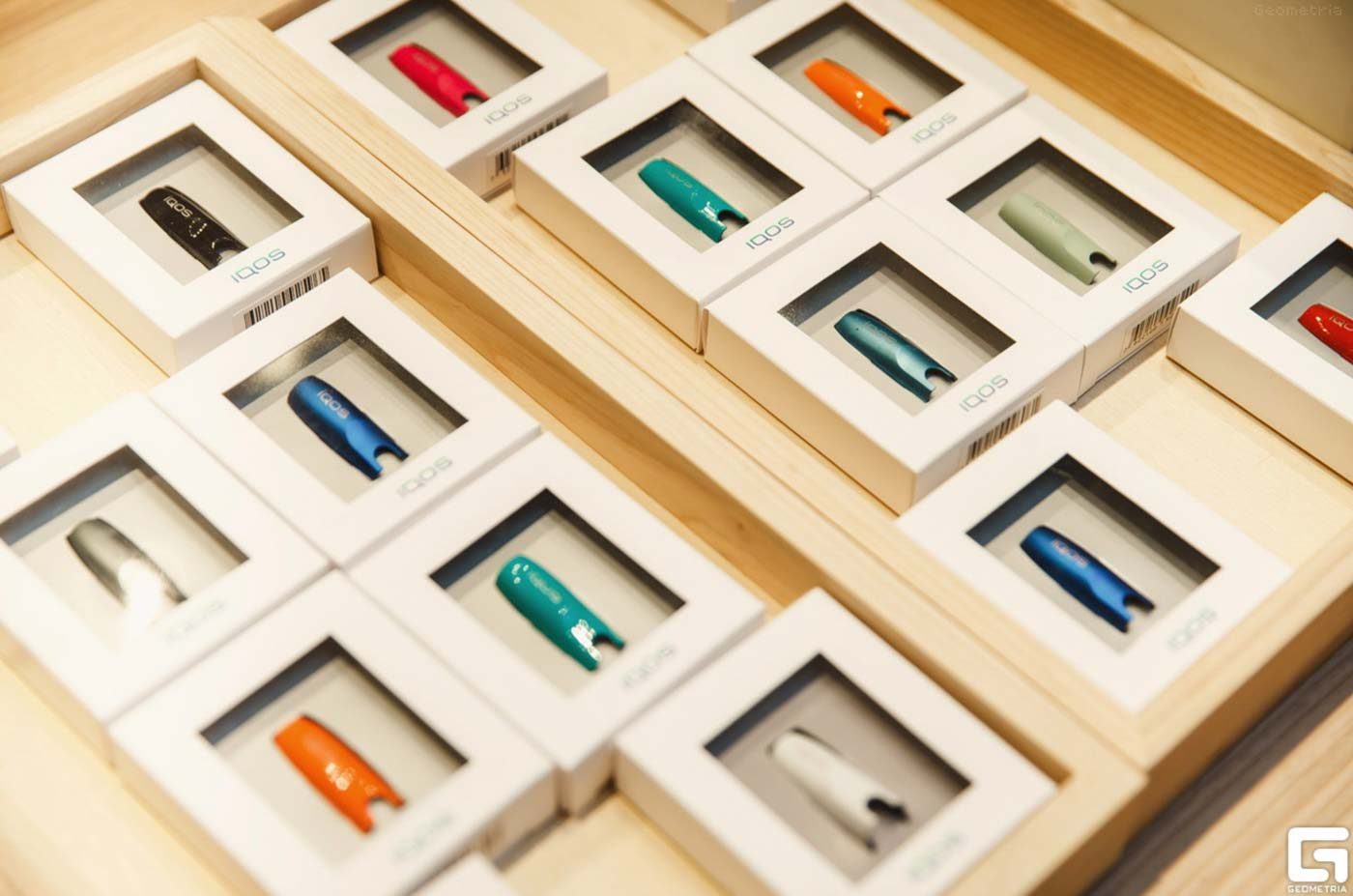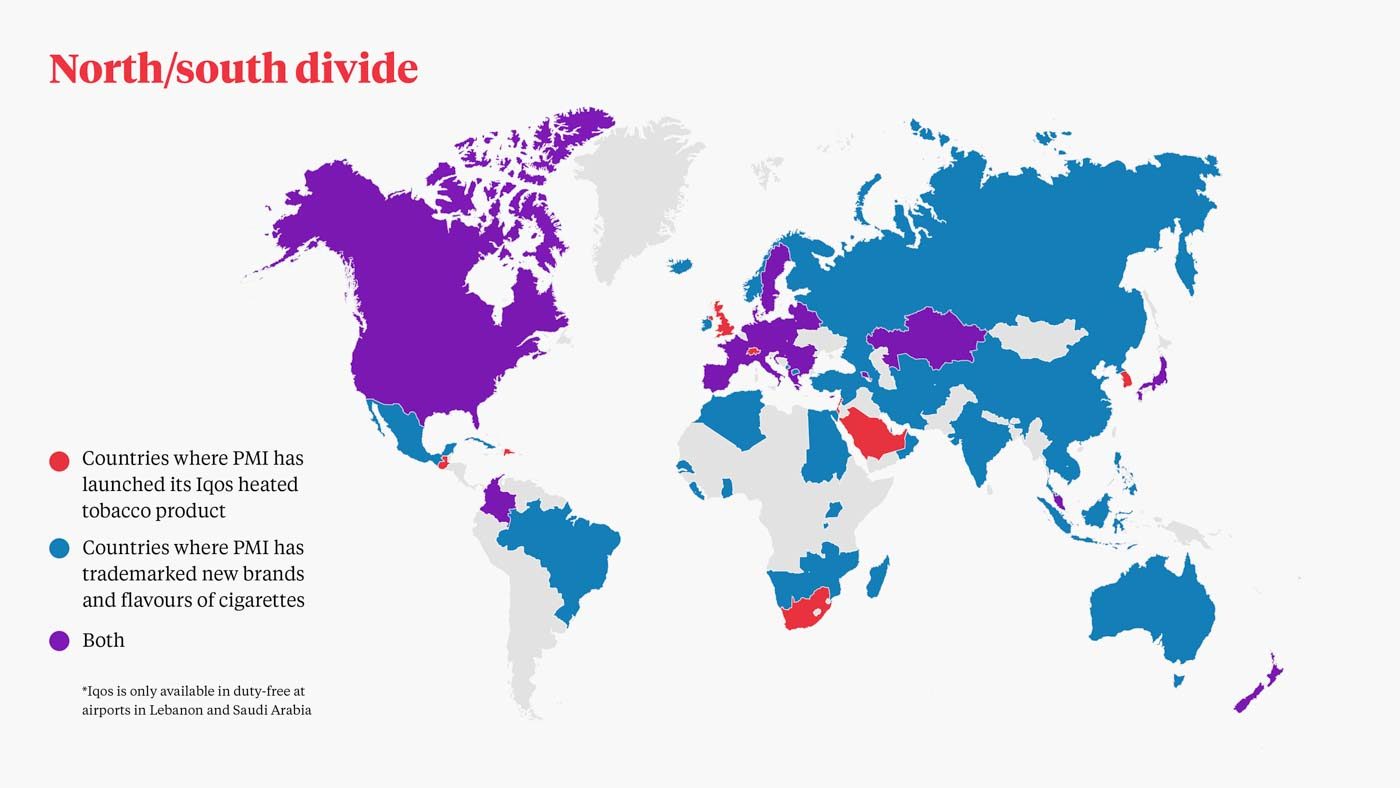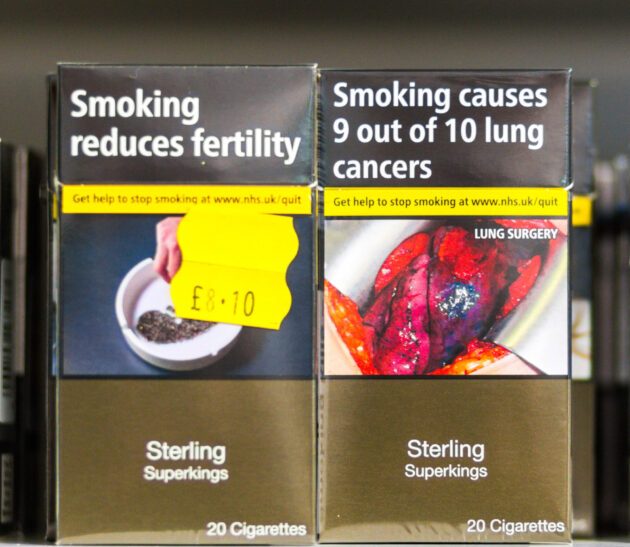SUMMARY
This is AI generated summarization, which may have errors. For context, always refer to the full article.

UNITED KINGDOM – The crowd screamed as Calvin Harris began his set at 2019’s Djakarta Warehouse Project, one of Asia’s biggest dance music festivals. The floor pulsed. As each song built, fans jumped up and down, climbed on each other’s shoulders or swayed as they filmed the DJ on their phones.
Opposite the main stage was a sleek building made of solid glass and red lights, with everything a festivalgoer needed to relax: sofas, televisions, Playstations – and cigarettes for sale. The Marlboro Penthouse gave Philip Morris International (PMI), the world’s biggest multinational tobacco company, an opportunity to promote its cigarettes to 90,000 young attendees.
Throughout the festival there were bright Marlboro signs over bars and benches where people sat smoking. There was a Marlboro “Discover Room” with interactive red, blue, and yellow booths, echoing cigarette-pack branding, and an arcade game. The festival’s shops sold only Marlboro-branded cigarettes and the company employed attractive saleswomen to roam around promoting the products.
That heavy promotion was curious, as 3 years earlier, PMI’s chief executive had made a claim so surprising it had made headlines all over the world. He had announced a new ambition for his company: to phase out cigarettes entirely.
In 2017, PMI officially laid out its vision for a “smoke-free” future. André Calantzopoulos, the previously camera-shy chief executive, started giving interviews about his company’s “transformation.” He wanted to switch smokers to PMI’s new range of cigarette alternatives, which he said, would improve public health.
Two years ago PMI said it could stop selling cigarettes by 2030 in the UK. A global campaign called “Unsmoke Your World,” promoting the idea that anyone could become an “Unsmoker,” was released a year later. PMI could be “part of the solution” to smoking, executives said. It hired advertising, PR and lobbying companies to promote a narrative of a new purpose-led, responsible business.
Yet careful scrutiny of its activities and internal documents by the Bureau reveals that much of the campaign is spin rather than substance – just as the recent advertising of Marlboro cigarettes to young Indonesians would suggest.
The Unsmoke mission is a marketing campaign for PMI’s new range of cigarette alternatives and a blatant attempt to rehabilitate the company’s image so it can once again seek to influence policy and regulations. Arguably, it has succeeded: although smoking rates have fallen in the past decade, PMI’s profits and share price have increased.
Some experts fear that if the company’s narrative is taken at face value PMI will continue to sell billions of cigarettes worldwide while promoting itself as “part of the solution” to smoking. It could lure a new generation into addiction with its new products, whose long-term health risks are unknown, and discourage people who might have quit altogether from doing so.
“The multi-billion dollar tobacco industry will do everything they can to stay in business,” said Dr Vinayak Prasad, head of the World Health Organization’s (WHO) tobacco control division. He believes that what they are saying is far from reality.
“If they really want to be a part of the solution, they should go tobacco-free, not smoke-free. If they are genuine about a tobacco-free society, they will readily embrace anything to reduce the demand for all forms of tobacco products.”
Dr Moira Gilchrist, a vice-president of PMI, told the Bureau: “Our vision is that one day smoke-free products will replace cigarettes. The sooner the world transitions away from cigarettes, the sooner we can stop making them.”
The era of Iqos

Calantzopoulos makes a point of using PMI’s flagship product, a sleek gadget that looks like a cross between an iPhone and an expensive pen. It is called Iqos, which is widely believed to be an acronym for “I Quit Ordinary Smoking” – although this is consistently denied by the company – and is now available in 52 countries worldwide.
It looks like an e-cigarette, or vape, but there is a key difference: it contains tobacco, where e-cigarettes only hold a nicotine solution. PMI has developed sticks of tobacco, called Heatsticks or Heets, which are inserted into the Iqos device and warmed to 350 degrees Celsius (much lower than the 800 degrees of a burning cigarette) until tendrils of aerosol are released. This mimics the rituals of smoking and gives users a satisfying kick of nicotine while inhaling fewer carcinogens.
Calantzopoulos, a Greek electrical engineer who has spent 35 years working for PMI, says he was smoking a pack a day until he switched to Iqos, his personal journey neatly echoing that of his company.
PMI calls Iqos a heated tobacco or “heat-not-burn” device; it is part of a new class of products sitting between vapes and traditional cigarettes.
There is a consensus that switching to vaping offers the best health benefits to smokers after quitting or using patches, gum, or prescription drugs that lower cravings. Heated tobacco products release fewer harmful chemicals than cigarette smoke, but more than e-cigarettes do. Neither product has been around long enough for experts to be sure that reducing the levels of toxic chemicals also reduces overall rates of disease.
Some studies have also found that Iqos emits higher levels than cigarettes of other chemicals, but not the ones known to be dangerous. Although these are not toxic in the short term, it is not known if they could have health effects over a longer period of use.
PMI said its testing on Iqos showed the concentrations of these chemicals “are below the level of toxicological concern.”
Some question why, if PMI wants to be “part of the solution” to smoking, it chose to heavily promote a heated tobacco product rather than an e-cigarette, when the potential health benefits of the latter are widely considered greater.
The answer comes down to economics, said Erik Bloomquist, a tobacco industry analyst. PMI could more easily adapt its cigarette manufacturing to make Heatsticks, while the profit margins for many e-cigarettes, especially those where users change the liquids and heating coils themselves, are miniscule.
Iqos was first launched in Japan, where e-cigarettes are banned, and within 4 years, gained nearly 16% of its overall tobacco market. Experts believe its introduction has led to falling cigarette sales. Iqos has also been a hit in South Korea, Russia, and Italy.
PMI says that 10 million smokers have switched to Iqos since it was launched. Calantzopoulos’ new ambition is to switch 40 million smokers from cigarettes to PMI’s alternative products by 2025. He describes the situation as a win-win: better for the smoker, and better for PMI, which can get better profit margins from Iqos if it is subject to lower taxes than cigarettes.
The company’s executives are working hard all around the world trying to persuade governments not to tax Iqos like a cigarette, to the chagrin of the WHO, which has advised against such a concession.
PMI said Iqos helps smokers, who find vapes unappealing, give up cigarettes. “What is most important is that adult smokers have access to a product that they are able to switch to and completely quit smoking cigarettes.” The company said it lobbied governments “because products like e-cigarettes and heated tobacco products should not be banned.”
Calantzopoulos will be wary of the backlash faced by Juul, the maker of America’s most popular e-cigarette, over accusations its early marketing appealed to teenagers. The company denies it ever targeted children but has since faced congressional hearings, federal investigations, and hundreds of lawsuits.
It is against this backdrop that Calantzopoulos maintains he only wants Iqos targeted at the world’s 1.1 billion adult smokers. However, a small Italian study found nearly half of people who had tried the product had never smoked.
PMI appears to have at times recruited occasional or social smokers to promote its devices. “I don’t smoke often, maybe only when I am at a party or having a glass of wine with some friends, but I was interested to find out about this device because it didn’t seem like just another electronic cigarette,” Gabriele Gzimailaite, a London fashion blogger told her readers in November 2017.
Gzimailaite, who has 120,000 Instagram followers, had been flown out to Milan by PMI for an Iqos party, where she posed against an Iqos-branded wall and posted pictures of the device.
Four months later, PMI paid for her stay at the luxurious Rosewood Hotel in London, which has launched Iqos-friendly rooms. Gzimailaite posted a picture of herself posing in a marble bubble bath, drinking a glass of rosé with her black Iqos and a magazine at her side. Another non-smoker has also promoted Iqos.
Calantzopoulos’ promise not to target non-smokers or teenagers is disingenuous, activists say. They argue that if PMI convinced its existing customers to switch to Iqos without attracting new ones, as it claims it wants to do, the company would go out of business within a generation.
“The main purpose is to prevent smokers who could be quitters to stay consumers of their products,” said Pascal Diethelm, president of Oxysuisse, a Swiss NGO dedicated to tobacco prevention. But even that could not sustain the company indefinitely – those smokers will die. PMI needs young people to create a new market, he said.
He points to investor presentations which appear to show PMI using the “theory of diffusion of innovation.” This is where there are “early adopters” of a product, who tend to be richer and more privileged than the rest of the population. As this group adopts the product they serve as influencers on the rest of the market, including young people. Diethelm believes this is why Iqos is being marketed as a luxury, hi-tech, aspirational product.
A visit to an Iqos shop does nothing to dispel this belief. It looks like an Apple store, with big museum table-cases displaying the latest devices. Colorful products are displayed in a rainbow on the wall, and young, hipster shop assistants stand ready to help.
While smoking rates fell in Japan after the introduction of Iqos, public health experts are concerned that not all smokers will switch completely from cigarettes. Independent studies and PMI’s own research show that many people tend to carry on smoking while using the device, negating the health benefits.
“Iqos probably falls halfway in between e-cigarettes and cigarettes on a toxic exposure scale,” said Richard O’Connor, professor of oncology at Roswell Park Comprehensive Cancer Center. “So basically there would be no real benefit to somebody who uses both products at the same time.” PMI did not dispute this.
Behind the smoke screen
Despite the PR push, PMI’s stated aim of phasing out cigarettes is not matched in a number of its business practices.
Its revenues from alternative products shot up from 0.2% in 2015 to almost 20% in 2019, but the vast majority still came from cigarettes. The company sold more than 740 billion cigarettes worldwide in 2018 and is only reducing its production by a few percentage points a year.
Calantzopoulos has also repeatedly reassured investors that PMI wants to remain a leader in cigarettes and will not give up market share to its competitors.
Since it announced its aim to stop selling cigarettes, it has acquired a new cigarette company, launched a new brand, and added enticing new flavors such as Splash Mega Purple and Fusion Summer. It has also launched legal action against anti-smoking policies in countries like the Philippines, and has carried on advertising cigarettes in countries that permit it.
NEVER SAY MAYBE. An Indonesian advert for Marlboro Red, a PMI brand
Some pupils in Indonesia can see PMI’s cigarette advertising mere steps from their schools’ gates. Young people attending festivals in Buenos Aires are offered PMI cigarettes in promotions with beer. Children visiting corner shops in Mexico can see Marlboro’s “fusion” cigarettes next to sweets.

“There’s a certain disingenuousness to the whole thing,” said O’Connor, who until recently sat on the US Tobacco Products Scientific Advisory Committee advising the FDA. He believes the company could easily switch many more people away from cigarettes if it wanted to.
“They can stop marketing cigarettes and market the heck out of Iqos and actively encourage people to use it. If you want to shift the market and you control most of that market, you could easily do it. They might lose a few share points on their stock, but I think it would be a much more rigorous demonstration that they really are changing.”
From pariah to ‘part of the solution’
Tobacco is still the leading cause of preventable death around the world, killing 8 million people a year and harming millions more. There is now indisputable evidence that smoking causes multiple types of cancer, heart disease, and respiratory illnesses, killing up to half of those who light up.
In 2006, Judge Gladys Kessler issued an extensive and damning set of findings during a landmark judgment against Philip Morris US, from which PMI later split. She cited evidence of the company’s decades-long campaign to hide the hazardous effects of smoking and secondhand smoke. Philip Morris had lied about the addictiveness of nicotine, manipulated nicotine levels to keep people addicted, misled the public about the health benefits of “low tar” or “light” cigarettes, and marketed cigarettes to teenagers.
Philip Morris had “marketed and sold their lethal product with zeal, with deception, with a single-minded focus on their financial success, and without regard for the human tragedy or social costs that success exacted,” she said.
By the start of the 21st century, PMI and the other tobacco companies were seen as pariahs in most industrialized countries, where social norms around smoking were changing. In 2003 an international WHO treaty was launched and widely adopted, mandating countries to adopt tried-and-tested policies to stop smoking. These included restricting contact with the industry and resisting its attempts to interfere in policy, entrenching tobacco companies’ status as distrusted outsiders.

“I think they [tobacco companies] could just see that the summit of the power and untouchable space that they inhabited for a very long time was not guaranteed for them anymore,” said Professor Johanna Cohen, director of the Institute for Global Tobacco Control at John Hopkins University.
By 2014, when Iqos launched in Japan, PMI knew it needed to change its image. Internal documents uncovered by Reuters in 2017 reveal it feared measures such as litigation and bans on political contributions, charitable donations and tobacco industry market research.
It launched a 10-year plan called “Normalization.” Its new objective was to “establish PMI as a trusted and indispensable partner, leading its sector and bringing solutions to the table.”
To achieve this it would “be ‘for’ something,” establishing a “forward-looking, motivational and credible” purpose statement.
It would also “balance the debate” by exposing the “double standards” of anti-tobacco campaigners and amplifying the voices of people who favored harm reduction – those supportive of offering smokers alternative products.
PMI planned to foster relationships with politicians, international organizations, NGOs, academics, scientists, researchers and the media, to promote its new purpose and products.
In the UK, PMI hired Pagefield, a PR company, to help to launch Iqos. In a blog post, the company describes the work as a good example of “helping distrusted companies gain acceptance.” Pagefield described the success of its strategy: “purpose was put before product and that made for a more captivating story.”
Normalization in action
The normalization strategy appears to be in full swing in the UK. After Iqos was launched, PMI executives appeared on ITV’s Good Morning Britain, BBC Radio 4’s Today program, and BBC Hard Talk describing the company’s transformation. It bought newspaper adverts and paid for events. It even funded a new website by Vice, Change Incorporated, that would publish articles on ending smoking, and sponsored Gay Star News’s health section.
As promised, it also forged relationships with politicians. In July 2018 it hosted a session in Westminster on how the company could work with MPs to “deliver a smoke-free future” with the Scottish MP Ross Thomson. It put up a stand at the Conservative party conference every year from 2017 to 2019, promoting its campaign to British politicians and their teams.
Despite its flagship product not being an e-cigarette, it was a founding member of the UK Vaping Industry Association (UKVIA), which funds an all-party parliamentary group on vaping, giving it access to British politicians.
PMI has always tried to rehabilitate its image, but its move into cigarette alternatives gave it a more persuasive message, said Deborah Arnott, chief executive of the campaigning public health charity Action on Smoking and Health.
“The coal industry spent an awful long time saying it supports green measures when what it was doing in practice was very different, the same is true for PMI,” she said. “We need to continue to protect public health policies. You can’t partner with the industry or allow the industry to determine the policy agenda because commercial vested interests mean shareholders’ needs will always take priority.”

PMI’s PR offensive took place on several different battlegrounds. In 2017 it announced it was setting up an independent organization, the Foundation for a Smoke-Free World, to pay for research on ending the smoking epidemic – and it would hand over $80 million (P4.09 billion) a year for 12 years to this new non-profit. In a massive publicity coup, a former WHO executive, Derek Yach, was hired to lead it.
The WHO itself publicly refused to engage with the foundation, identifying it as an organization that “further[s] the interests of the tobacco industry.” It told governments and the public health community to follow its lead. It was soon being described in some quarters as a front group for PMI.
The Foundation says it “funds research, promotes innovation, and supports collaborative initiatives to accelerate progress in reducing harm and deaths from smoking.” Its health research grants have been largely focused on harm reduction, not ending smoking, in line with PMI’s needs to normalize and legitimize cigarette alternatives like Iqos. Some of the recipients of its grants have links with the tobacco industry.
An analysis by the University of Bath of the Foundation’s latest published tax returns reveals that it spent more on hiring PR and communications agencies than scientific research. The university is a research partner of STOP, the global tobacco control campaign. Tess Legg, co-author of the Bath report, believes that the Foundation is not simply a scientific research organization.
“The Foundation is promoting PMI’s rhetoric on harm reduction, next generation products and the role the tobacco industry wants to play in science and policy-making, but often without the reader or the listener being aware that these messages are funded by the tobacco industry,” she said.
The Foundation said its 2019 tax returns would show it is now spending most of its budget on research. A spokesman added: “There is no tobacco industry influence on the Foundation’s work.”
‘This changes everything’
The April 2019 launch of Iqos in Tirana, Albania, drew a fashionable crowd. Guests walked down a white carpet flanked by palm trees and lit by spotlights until inside an Iqos-branded tunnel they were met by hostesses in futuristic dresses. Hands emerged from velvet curtains to hand them champagne.
TV screens on the wall played videos of erupting flames. “Stop burning, start heating,” the text read as a gold Heatstick slipped smoothly into the Iqos device.
There have been similar launches for Iqos products all around the world, some headlined by Jason Derulo or Jamiroquai. PMI has also sponsored Iqos-branded parties for Playboy magazine in Germany and Cosmopolitan magazine in Russia.
In the UK, where advertising of both the device and Heatsticks is banned, marketing is limited to PMI’s website, Iqos shops, and displays in vape shops. But where regulations are looser, PMI is advertising Iqos far more aggressively.
Its campaign features social media influencers, events, collaborations, glass-fronted shops and an army of brand ambassadors, according to a report compiled by Stanford University. “The advertising tries to portray Iqos as aspirational, high tech, healthy, fashion-conscious, clean, fun and link it with fashion, travel, leisure, and relaxation. Some adverts imply Iqos helps make people more successful in romance by improving their kisses and their teeth, as well as being a good way to show love to family and friends,” Professor Robert Jackler, who led the research, said.

Instagram posts show Iqos with coffee, alcohol, and food. Young, attractive, professional people are shown laughing, socializing, or looking happy with their devices. Some ads show Iqos with surfers and runners, implying it is a product to suit healthy, outdoors-y lifestyles.
Elsewhere, Stanford researchers uncovered examples of explicit health claims, including a post from Iqos’s Instagram page in Japan that promoted it as a way to avoid lung cancer, emphysema, and heart attacks when compared with smoking, which, an expert said, is not backed up by evidence. PMI disputes some of Stanford’s findings.
In the US and UK, PMI cannot legally claim Iqos can help quit smoking or lower the risk of disease. The UK Department of Health wrote to PMI in 2018 to tell the company to stop sending posters advertising the device to convenience stores.
PMI was forced to suspend its own social media influencer campaign when it emerged in May 2019 that the company had hired models who were under 25, against its own internal guidelines. But the Stanford researchers have uncovered an Armenian account that featured attractive young influencers posting about Iqos.
The researchers also found Instagram posts that seemed to target even younger teenagers. Instagram posts from Ukraine and Armenia showed young-looking girls posing with pastel-colored Iqos devices. Others posed the devices against a backdrop of ice creams, palm trees, and seashells.
“It has used the exact same strategy and the exact same images it used to make Marlboro the most popular cigarettes for kids worldwide,” Matt Myers, president of the Campaign for Tobacco Free Kids, said.
“If governments don’t respond strongly and directly, Philip Morris International will use Iqos to renormalize tobacco use and reach a whole generation of young people who otherwise never would have smoked.”
‘Smoke-free’
Reto Auer, a doctor and researcher at the universities of Bern and Lausanne, bought an Iqos after seeing adverts that said it did not produce smoke. He smoked it in the office as his colleagues watched, noticing black charring on the Heatstick and that it smelt like burnt tobacco.
Suspicious that the charring suggested incomplete burning, called pyrolysis, his team set up a study to determine whether Iqos produced smoke or not. Their conclusion? It did.
“Basically what the Iqos is, is a portable toaster,” he said. “If you leave your bread long enough, it will become black. At what point do you say your toast is burnt? Is that bread vapor that comes out of your toaster? No, we call it smoke.”
Auer and his team believe PMI is “dancing around” the definition of smoke to avoid indoor smoking bans. In Japan, while smoking is banned indoors, Iqos is not; there are “no smoking, Iqos only” signs. “If you have only the Iqos indoors, and all other cigarettes outside, then you have no competitors,” Auer said.
In countries including Japan, Romania, Ukraine, Vietnam, Russia, Czechia, and Spain, PMI has created its own cafés and lounges, where menus pair coffees with particular flavors of Heatstick. It has launched a global network of “Iqos-friendly spaces”: bars, hotels, restaurants or public areas like beaches where people can freely puff on their Iqos.
Mapping Iqos’s launches reveals a pattern. Iqos has mainly been promoted in countries that have introduced smoking or tobacco advertising bans and where cigarette sales were falling, according to Bath’s analysis. “They needed something else to make profit in the future in those countries because people were stopping smoking,” said Karen Evans-Reeves, co-author of the report.

Within the UK there are Iqos shops in London, Manchester, Bristol and Cardiff, but none in Hull, Burnley, or Mansfield where PMI’s research shows smoking rates are highest.
Dr Gilchrist, a vice-president of PMI, said: “For PMI, the long-term business opportunity is to convert adult smokers who would otherwise continue to smoke cigarettes to better alternatives.”
“A campaign coordinated by American special interest groups, all of whom are seemingly funded by the same source – Bloomberg Philanthropies – are dedicated to just one mission. Under the guise of promoting public health, they are working to rob adults who smoke of their right to choose scientifically substantiated better alternatives to continued smoking.”
The Bureau’s Smoke Screen project, scrutinizing the tobacco industry which kills millions a year, is funded by a non-governmental organization, Vital Strategies, which is, in turn, funded by Bloomberg Philanthropies. The Bureau is a non-profit predominantly funded by grants from dozens of foundations and fully discloses all of its funders. Neither Vital Strategies nor Bloomberg Philanthropies has any say over the Bureau’s journalism.

Iqos has yet to be launched in Indonesia, PMI’s biggest market for cigarettes. There, more than 2/3 of men and nearly one in 5 teenagers smoke. People in their 30s are dying of heart-related diseases linked to tobacco. Videos of toddlers addicted to cigarettes appear regularly.
Calantzopoulos’ desire to phase out cigarettes may be genuine, but he is hamstrung by an obligation to maximize profit for shareholders, which rules out suspending cigarette advertising or sales.
Perhaps Indonesia’s smokers will eventually all quit or switch to alternatives. Under the neon lights of the Marlboro Penthouse, that day seems a long way off. – Rappler.com
This story is produced in partnership with Dispatches. The Secrets of Big Tobacco: Has Philip Morris International Really Given Up Smoking? Is available on All4.
HEADER IMAGE: An Iqos promotional event. Credit: Stanford University
Add a comment
How does this make you feel?
There are no comments yet. Add your comment to start the conversation.